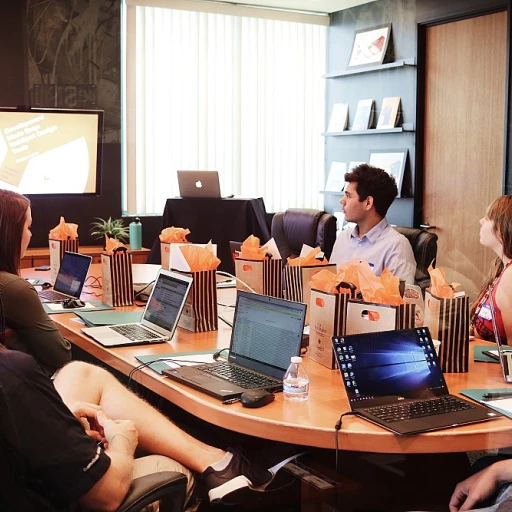
The Power of Continuous Learning in Everyday Life
Embracing Lifelong Learning in Daily Life
In today's fast-paced world, the significance of continuous learning in our everyday lives cannot be overstated. It's not just about staying competitive in the job market; it's about personal enrichment and growth. The ability to learn continuously and adapt to new information and skills is what sets individuals apart in all areas of life. Consider the small moments in your day where learning can be seamlessly integrated. For instance, during your morning commute, you might listen to a podcast that introduces a new perspective on a topic you're interested in. Or perhaps, while preparing dinner, you explore a new recipe that incorporates culinary techniques from a cuisine you have yet to master. These are simple ways to weave learning into everyday activities. Developing this mindset is crucial, and it begins with recognizing the broad spectrum of learning opportunities around us. From reading books and attending workshops to engaging in conversations with peers, the avenues for learning are vast and diverse. By embracing these experiences, you not only enhance your repertoire of skills but also cultivate resilience and adaptability—traits that are invaluable in both personal and professional arenas. A great step towards fostering a growth attitude is exploring how to nurture lifelong learning habits actively. By doing so, individuals can unlock new opportunities for personal and career development, and the journey becomes an enriching part of life itself. For some insightful strategies, you might want to check this resource on nurturing a growth attitude.here.Creating a Culture of Continuous Learning at Work
Fostering a Learning-Oriented Workplace Environment
In today's dynamic and ever-evolving professional landscape, organizations recognize the necessity of staying ahead of the curve by fostering a learning-oriented environment. Building a culture that encourages continuous education within the workplace not only boosts employee engagement and job satisfaction but also drives innovation and business growth. Creating a robust learning culture begins with leadership commitment. Leaders who prioritize professional development and model lifelong learning behaviors set the tone for their teams. By actively participating in learning opportunities, they demonstrate the value of knowledge acquisition and inspire their employees to follow suit. Managers and team leads should routinely allocate time and resources for training and skills enhancement, effectively embedding learning into the organizational fabric. Encouraging open communication and collaboration is another cornerstone of a learning-focused workplace. By promoting open dialogue and sharing of ideas, employees feel empowered to seek knowledge and develop their skills. Incorporating various platforms for team collaboration, discussion, and peer learning can facilitate the exchange of insights and experiences. This collaborative approach not only enriches the collective knowledge base but also enables team members to learn from each other’s successes and failures. Additionally, organizations can incentivize learning by recognizing and rewarding employees who actively engage in skill development. Simple gestures, such as certifications, badges, or public acknowledgment of learning achievements, can go a long way in motivating employees to pursue continuous growth. Furthermore, personalized learning plans and access to resources such as workshops, online courses, or mentorship programs can help employees align their learning objectives with career aspirations. Incorporating technology into workplace learning is another significant aspect discussed in our comprehensive approach to continuous learning. The strategic use of educational technology platforms can support the delivery of personalized, on-demand learning experiences tailored to individual employee needs and organizational goals. To fully embrace and benefit from a learning-oriented culture, organizations should constantly reassess and adapt their strategies to ensure they meet the evolving learning needs of their workforce. By cultivating a culture where learning is a shared value, companies position themselves and their employees for sustained success in an ever-changing world. For further insights, explore our guide on embracing a culture of lifelong learning and career growth.Building a Lifelong Learning Mindset
Embracing a Lifelong Learning Attitude
To truly thrive in our rapidly changing world, it's essential to foster a mindset that prioritizes ongoing education. This isn't just about acquiring new technical skills; it's about cultivating an open and curious attitude towards exploring varied knowledge fields at all times. A lifelong learning mindset encompasses a genuine curiosity and the courage to step outside one's comfort zone to embrace new challenges. One effective way to cultivate this attitude is by setting specific, manageable learning goals. These goals should be aligned with both personal passions and professional aspirations. By doing so, you're more likely to remain motivated and engaged throughout the learning process. Consider breaking these goals down into smaller milestones, which can provide a sense of achievement and progress. Reflection is another key aspect of building a lifelong learning mindset. Regularly evaluate your learning experiences, extract valuable lessons, and identify areas for improvement. Reflection not only reinforces what you've learned but also fosters a deeper understanding and encourages continuous growth. Moreover, surrounding yourself with like-minded individuals can nurture a growth-oriented mindset. When you're part of a community that values learning, you're more likely to share ideas, inspire one another, and keep the momentum going. Engaging in discussions, attending workshops, or joining online forums can be excellent ways to connect with others who share your enthusiasm for learning. Lastly, it's crucial to remind yourself that setbacks are part of the learning journey. Embrace failures as opportunities for growth and maintain a resilient outlook. With determination and a proactive approach, you'll be more equipped to turn challenges into stepping stones for further learning. By adopting these perspectives and strategies, anyone can successfully build and maintain a mindset that drives lifelong learning, opening doors to both personal enrichment and professional advancement.Strategies for Developing Lifelong Learning Habits
Engaging in Reflective Practices
When it comes to cultivating lifelong learning habits, engaging in reflective practices can be a game-changer. Taking time to reflect on your learning experiences allows you to understand what worked well, what didn’t, and how you can improve future learning endeavors. By setting aside a regular time for reflection, you not only consolidate your learning but also make meaningful connections between new information and existing knowledge. This reflective process helps you become more self-aware, open-minded, and adaptable.Prioritizing Your Learning Goals
To develop effective continuous learning habits, it's crucial to prioritize your learning goals. Start by identifying what you need to learn to achieve both your personal and professional objectives. Break down larger goals into manageable, actionable steps. This approach not only makes your learning journey less overwhelming but also allows you to celebrate small wins along the way, keeping you motivated and focused.Incorporating Learning into Daily Routines
One of the most successful ways to build sustainable learning habits is to incorporate learning into your daily routines. Whether it’s listening to podcasts during your commute, reading a few pages of a book before bed, or dedicating time during lunch breaks to watch educational videos, weaving learning activities into your everyday life ensures that you’re constantly absorbing new knowledge without requiring a significant overhaul of your schedule.Setting Up Accountability Systems
Accountability systems can significantly enhance your ability to maintain lifelong learning habits. Collaborate with a learning partner or join a study group to help keep each other on track. Alternatively, make use of digital tools and apps that remind you of your learning goals and track your progress. Whether it’s through shared achievements or friendly nudges, accountability systems provide the support and motivation needed to stay committed to your learning journey.Striking a Balance Between Structured and Unstructured Learning
While structured learning activities like courses and workshops are important, embracing unstructured learning is equally essential. Allow yourself the freedom to explore topics that spark your curiosity without a strict agenda. This balance between structured and unstructured learning encourages creativity, leads to unique insights, and keeps your learning experience engaging and enjoyable. In developing these strategies, remember that creating a mindset conducive to lifelong learning is an evolving journey that demands patience, adaptability, and a willingness to embrace both successes and setbacks along the way.Leveraging Technology for Continuous Learning
Embracing Digital Platforms for Skill Enhancement
In our modern era, the digital world offers an abundance of tools and resources that can significantly boost our learning experiences. Utilizing these platforms effectively requires a keen understanding of which resources can best serve your unique learning goals. With countless apps, online courses, and virtual seminars available, individuals can now access a variety of learning styles, whether through video lectures, interactive modules, or comprehensive reading materials. Furthermore, many online platforms offer personalized learning paths, allowing you to learn at your own pace and tailor content to your specific needs. These platforms often incorporate tools like quizzes and progress tracking to reinforce learning and maintain motivation.Optimizing Learning through Online Communities
One of the most powerful aspects of digital learning is the sense of community it fosters. Engaging with others through social media groups, webinars, or discussion forums can enrich your understanding by exposing you to diverse perspectives and new ideas. The global reach of the internet means that you can connect with experts and learners worldwide, further enhancing your knowledge and promoting a sense of shared learning. These communities often encourage collaboration and offer opportunities for feedback, both of which are crucial for improving our skills. By actively participating in these online networks, you can keep your learning passion ignited and continuously push the boundaries of your current knowledge.Leveraging Technology with Time Management Tools
Incorporating technology into your learning routine doesn't just stop at the acquisition of knowledge; technology can also assist with the management of your time and learning schedule. Applications and software designed for productivity can help balance personal and professional commitments with educational pursuits. By using digital calendars, task managers, and reminders, you can create a structured learning plan that integrates seamlessly with your daily life. Additionally, adopting time management tools ensures that learning becomes an ongoing process, rather than a sporadic endeavor. Setting specific times each day or week for learning activities helps to establish a routine, gradually turning learning into an ingrained habit. The seamless integration of technology into our learning routines opens up a world of opportunities, ensuring that continuous learning becomes an effortless part of everyday life. As we continue to engage with these digital resources, it is essential to remain open-minded and adaptable, qualities that are indispensable for nurturing a lifelong learning mindset.Personal Stories of Lifelong Learners
Inspiring Journeys of Lifelong Learners
Continuous learning is not just a concept; it is a transformative journey that many individuals embark on, leading to both personal and professional growth. Let's delve into some inspiring stories of lifelong learners who have embraced this mindset and reaped its benefits.
Maria's Quest for Knowledge
Maria, a marketing professional, realized early in her career that the industry was ever-evolving. To stay ahead, she committed to learning something new every day. Whether it was attending webinars, reading the latest industry reports, or participating in online courses, Maria's dedication to continuous learning has not only kept her skills sharp but also positioned her as a thought leader in her field. Her story exemplifies the power of integrating learning into everyday life, as discussed earlier.
John's Cultural Shift at Work
John, a team leader at a tech company, understood the importance of fostering a culture of continuous learning at work. He encouraged his team to share knowledge and learn from each other, creating an environment where everyone felt empowered to grow. This cultural shift resulted in increased innovation and collaboration, highlighting the significance of creating a learning-friendly workplace.
Emma's Mindset Transformation
Emma, a school teacher, was once hesitant about adopting new teaching methods. However, after attending a workshop on building a lifelong learning mindset, she embraced change and started experimenting with new techniques in her classroom. Her willingness to learn and adapt not only enhanced her teaching skills but also inspired her students to become lifelong learners themselves.
Raj's Strategic Approach
Raj, an entrepreneur, developed a strategic approach to lifelong learning by setting clear goals and regularly assessing his progress. By leveraging technology, such as podcasts and online courses, he efficiently integrated learning into his busy schedule. Raj's story underscores the importance of having a plan and using available resources to facilitate continuous learning.
These personal stories demonstrate that lifelong learning is a rewarding journey that can lead to significant growth and fulfillment. By adopting a mindset that values learning, creating supportive environments, and utilizing technology, anyone can become a successful lifelong learner.













